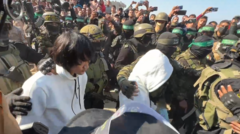In a historic agreement facilitated by the Vatican, Cuba is releasing hundreds of anti-government protesters who were imprisoned during civil unrest in 2021. This decision comes after President Joe Biden removed Cuba from the US list of state sponsors of terrorism, a shift that's raising eyebrows amid potential changes in US foreign policy. As a result, Cuba has committed to freeing 553 prisoners, many of whom have been behind bars for demanding governmental reforms.
Cuba Begins Release of Anti-Government Protesters Following US Pact

Cuba Begins Release of Anti-Government Protesters Following US Pact
In a significant move following diplomatic negotiations with the US, Cuba has commenced the release of prisoners detained during 2021 protests.
On Wednesday, Cuba released around 20 of these detainees, including Donaida Pérez Paseiro, who had been sentenced to eight years in prison for her protests against food shortages and economic hardships on the island. In her emotional social media video, she indicated that the Cuban government was using prisoners as leverage in negotiations with the US. Another released prisoner, Dariel Cruz García, expressed his relief at being freed after serving time for sedition and emphasized his commitment to maintaining good behavior.
While the Cuban government celebrates this step forward, skepticism remains regarding the longevity of the agreement, especially with incoming officials from the Trump administration hinting at potential reversals. Current Cuban judicial authorities have issued warnings, stating that the released prisoners must abide by the terms of their parole or risk being re-arrested. The situation remains tense as numerous families await news on the status of their loved ones still imprisoned.
Cuba's diplomatic relations with the US are again under scrutiny, with many hoping that the release of these protesters might signal a thaw in relations. However, the future of this agreement rests on the incoming administration's policy decisions.
While the Cuban government celebrates this step forward, skepticism remains regarding the longevity of the agreement, especially with incoming officials from the Trump administration hinting at potential reversals. Current Cuban judicial authorities have issued warnings, stating that the released prisoners must abide by the terms of their parole or risk being re-arrested. The situation remains tense as numerous families await news on the status of their loved ones still imprisoned.
Cuba's diplomatic relations with the US are again under scrutiny, with many hoping that the release of these protesters might signal a thaw in relations. However, the future of this agreement rests on the incoming administration's policy decisions.




















